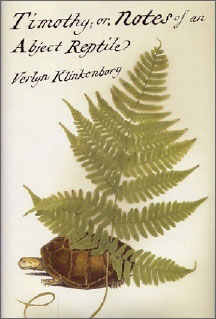 |
 Verlyn Klinkenborg
Verlyn Klinkenborg
Timothy; Or, Notes of An Abject Reptile
Reviewed by: Rick Kleffel © 2006
Alfred A. Knopf / Borzoi / Random House
US Hardcover First Edition
ISBN 0-679-40728-6
Publication Date: 02-08-2006
184 Pages; $16.95
Date Reviewed: 03-26-06
Index:
General Fiction
Non-Fiction
Fantasy
Let's make this clear from the outset. The reptilian narrator of Verlyn Klinkenborg's luminous 'Timothy; Or, Notes of An Abject Reptile' is abject only in the sense that she is humble. And she's not that humble, well, at least for a tortoise. (Yes, Timothy is a she, as determiend by scientists who examined the shell.) Klinkenborg's novel is as deviously, deceptively simple in its execution as it is clever and complex in its conception. But Klinkenborg packs an entire library's worth of reading into this short work. Readable at just about any level -- from a simple nature-tale for young adults to a complex work of transcendental fictionalized non-fiction -- the book's layers are meshed with the purity of an utterly organic creation. 'Timothy' earns every tear it wrings out of the reader. Tears of joy, tears of sadness. Prepare to be moved by this talkative tortoise.
The premise of 'Timothy' deserves a bit of space. In 1789, an English naturalist named Gilbert White published a book titled The Natural History of Selborne. Here he details his thoughts and discoveries of the species that surrounded him in his English paradise. Among those creatures was a tortoise that he bought and that outlived the author. In 'Timothy' Verlyn Klinkenborg takes on the point of view of Timothy, the tortoise, and tells the tale of Timothy's eight-day escape from White's country parsonage.
Timothy may be abject but she's not in the least bit shy. The prose that Klinkenborg uses to tell the story is admirably direct and subtly poetic. Most importantly, Klinkenborg is utterly, transparently at ease with his premise. He immerses himself in Timothy to the degree that any reservations one might have about a tortoise telling a story immediately disappear. And once you're there, the prose and the perspective are stunningly gorgeous. Klinkenborg plays with the language enough to make sure we know that this isn’t simply a wise old man wearing a turtle shell, but not so much that the work loses accessibility. It's a delicate balancing act, and Klinkenborg uses the sense of balance, the gentle sways, to generate reading tension to keep the words flowing. It's a masterful performance that only a highly skilled writer could pull off. Klinkenborg never misses a beat.
Klinkenborg also plays with form here, and just as in voice, all his rather mind-boggling innovations simply flow. 'Timothy' is not exactly a novel, it's not exactly a biography, it’s not exactly a nature tale, and it's not exactly an essay. This is innovation that is totally inspired and inspiring. Klinkenborg never draws attention to anything but the flow of the words and images. Still, when the reader steps back, it’s clear that 'Timothy' is vibrantly inventive. Our not-so-humble narrator quotes from White's book and journals, observes nature, offers bird-watching and gardening lore and comments on man's interaction with his environment. Though the whole hangs together organically, and is surely greater than the sum of the parts, the sum of the parts is pretty astronomical in its own right. Klinkenborg is highly ingenious and large parts of his ingenuity go to drawing the reader's attention away from the innovation and into the heart of the story.
The story is epic even if the tale is short. In the few pages allotted him, Timothy tells the story of his whole life, the life of Gilbert White, the story of Selborne and manages to invoke no less than the spirit of Gaea herself. Klinkenborg is nothing if not ambitious, though you'd never think that until well after you’re done reading the book. 'Timothy' proves itself to be a work in the transcendental tradition of Emerson and Thoreau, a gorgeous meditation on man's place in the world and in himself. Seen through the outside and dispassionate eyes of Timothy, the world around Selborne is fragile, beautiful and dependent upon a seemingly infinite number of connections. Timothy sees those connections with a clarity that White cannot. The reader can see everything, everything!
Timothy is first and foremost a joy to read. Klinkenborg's language is exquisite and highly intelligent. He manages about one write-it-down-memorable sentence per page, and he embeds these in a sea of prose that is a pleasure to read aloud. Timothy is often very funny. Yes, it's a dry humor, but she is a tortoise, so, that's to be expected. Klinkenborg's anthropomorphosis is perfectly pitched. He never even comes close to cuteness. 'Timothy' is never precious, never less than authentically observant. Klinkenborg makes the wise but not necessarily obvious decision that the reader is every bit as smart as the tortoise.
'Timothy' is one of those understated, almost invisible works of high imagination that many readers will not even consider fantastic fiction, though it is indeed fantastic. The skill level at work here is completely concealed by the power of the narrative. The meta-fictional nature of what Klinkenborg is on about becomes a bit clearer when you encounter the glossary. But for most readers, I suspect the glossary will be unnecessary. Klinkenborg's vision is so clear, there's no doubt what he's referring to, even when he employs archaic terminology or refers to bird species few Americans will have had to good fortune to see. This addendum is itself a wonderful riff on language, and a tribute to White's work.
Klinkenborg's seamless, organic creation seems headed straight for classic status, even though it's really too enjoyable to send straight to the classroom. This is the perfect book to spend a day with, then another, then another. It compels not just reading, but re-reading. 'Timothy' is time spent in a perfect English garden.
|
 |
